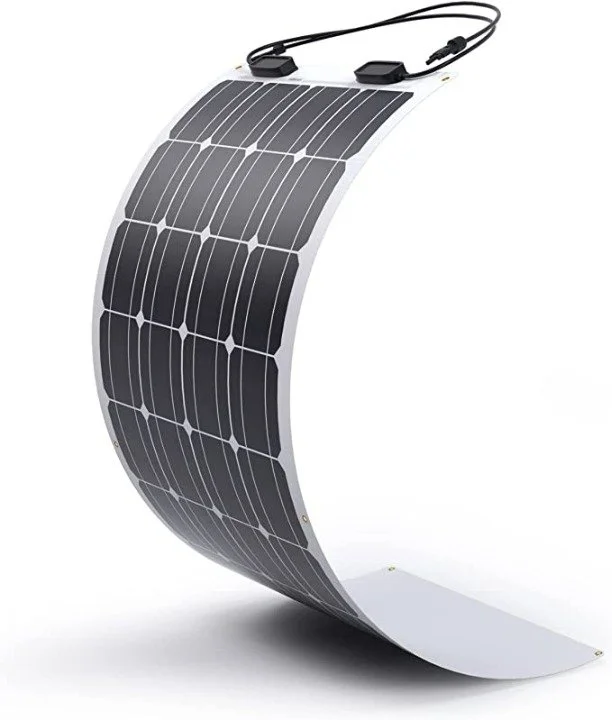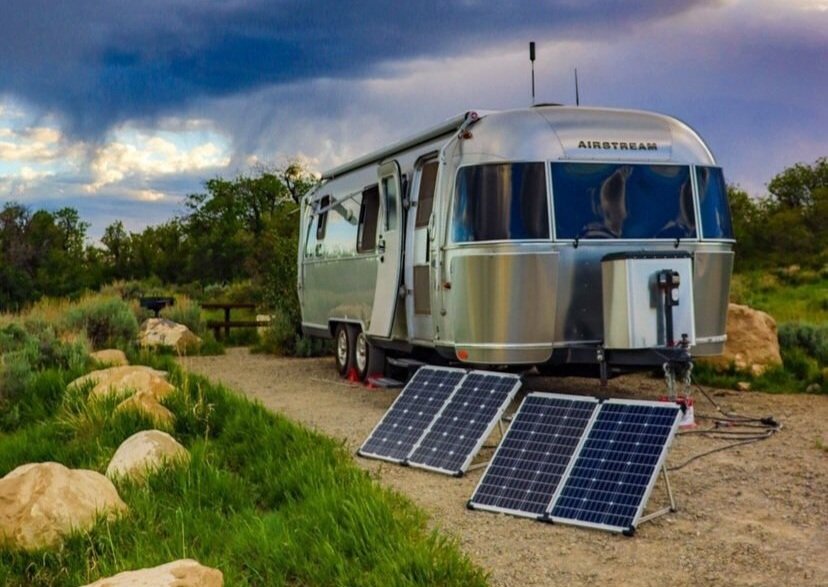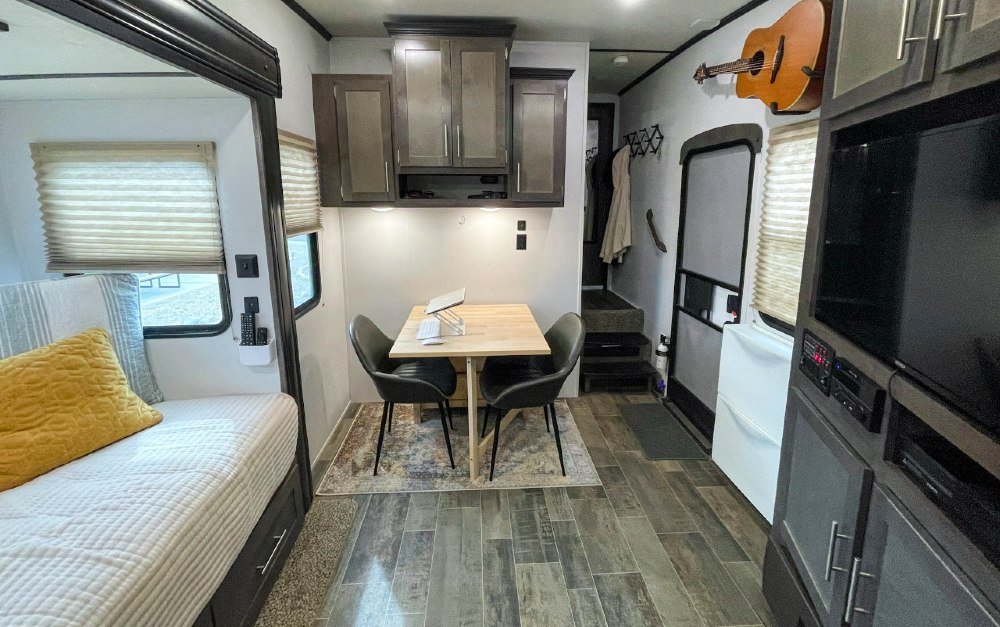Anyone looking to take their RV off-grid should consider adding RV solar panels to their rig.
Solar panels were one of the best additions to our RV that we installed ourself. We never had to use a noisy generator or worry about our house batteries dying in the middle of a camping trip.
After living in our RV for over 2 years and staying off-grid for most of it, we have learned which RV solar panels we love and solar panels for RVs are more hype than quality. We rated our favorite solar panels based on price, durability, and ease of use.
We included options that will work for different RV sizes and budgets.

RV Solar Panels
-
How Many Solar Panels are Needed: To know how many solar panels you need to run an RV you will need to start by calculating how much electricity you plan to use in a day and how long for each appliance. Overall most recommend 200-300 watts of solar panels for every 100 amp hrs of battery storage.
-
Rigid vs Flexible: Rigid solar panels are more durable and more affordable for the same amount of watts. Flexible solar panels are great for RVs with curved roofs like Airstreams because they can fit the contour of your roof. Another benefit of flexible panels is that you don’t have to put as many holes in the roof of your RV.
-
Monocrystalline vs Polycrystalline: I recommend that you buy monocrystalline panels as they are around 50% more efficient and only slightly more expensive.
-
Mounted vs Portable: Mounting your solar panels your RV’s roof is a big decision. Some people don’t want to put any holes in the roof. On the other hand, storage in your RV is very limited. Do you want to use some of your valuable storage for your solar panels? Also, if you are moving frequently, setting up and taking down your portable panels could be a headache.
We chose to mount our solar panels to the roof of our RV to avoid needed storage space and having to set up the panels in every campsite.
-
Using RV A/C on solar power: You can run your RV air conditioner on solar power if you have a large enough inverter and battery power bank to sustain. You will need at least a 3000 watt inverter to run a standard RV A/C.
It’s also a good idea to install a soft start on your A/C unit to ease the power surge when starting the A/C’s compressor. Even if you buy an expensive inverter, running your A/C will drain your batteries quickly. We had 400 Amp hours of lithium batteries, and running the A/C for 2 hours would take our batteries from 100% to 25%.
-
Panel Size: You should choose the panel size and arrangement based on the space you have to mount or store your panels. Don’t forget to work around the A/C and vents. If you are storing portable panels rather than mounting them, I recommend choosing panels around 100 watts. Large panels can be difficult to store and set up.
Best Solar Panels for RV
For those camping frequently where electricity isn’t common, RV solar panels are absolutely worth the investment for your RV.
Whether you want to spend the time and investment for fixed solar panels on your RV or start with a quality portable solar panel kit, there are a number of great options to be able power your RV off-grid.
Here is a list of our top-rated RV solar panels:
1) Renogy Rigid Solar Panel
Best for: an RV that has space to mount solar panels on the roof

Review:
Renogy is the best selling brand of solar panels for RVs. They make high quality panels in various sizes, and their pricing is reasonable. They also offer a 5 year Material and Workmanship Warranty and a 25 year Transferable Power Output Warranty for peace of mind when purchasing.
We put our Renogy solar panels through the ringer for over 2 years, and they held up very well. They survived thunderstorms, strong winds, snow, and hail without any damage or efficiency loss. I was nervous to check the panels after our first hailstorm in the RV, but I was pleasantly surprised that the panels still looked brand new.
Renogy offers their rigid RV solar panels in many sizes and packages. They also offer RV solar starter kits that include solar panels, mounting hardware, a charge controller, and wiring. If you are going with a kit, make sure you choose one with an MPPT charge controller (“Rover”) over their PWM option (“Wanderer”). MPPT charge controllers are more efficient and flexible.
2) Renogy Flexible Solar Panel
Best for: an RV with a curved roof or a roof that you don’t want holes in (Airstream)
Review:
While we love Renogy’s rigid solar panels for RVs, flexible panels work better in some situations. They particularly work well with Airstreams.
Our nomad friends with an Airstream chose Renogy’s flexible solar panels because they could fit the rounded contour of the roof. They also didn’t have to worry about putting new holes in the aluminum. Freedom in a Can gives a great review on the durability of their flexible solar panels after traveling the country for 9000 miles.
Because the flexible panels lay flat on the roof, you can use a construction grade adhesive instead of mounting brackets and screws. Additionally, most also recommend using a thin (1/4inch) insulation barrier between the solar panel and roof to allow airflow and prevent any over-heating issues.
At $1.36 / watt, Renogy’s flexible solar panels are more expensive than the rigid option ($0.90 / watt). You will save a little bit of money on gas because the flexible panels are lighter and more aerodynamic, but for some this savings won’t be enough to offset the 51% up-front cost difference.
3) Renogy Solar Panel Kit
Best for: best in class portable solar panel kit
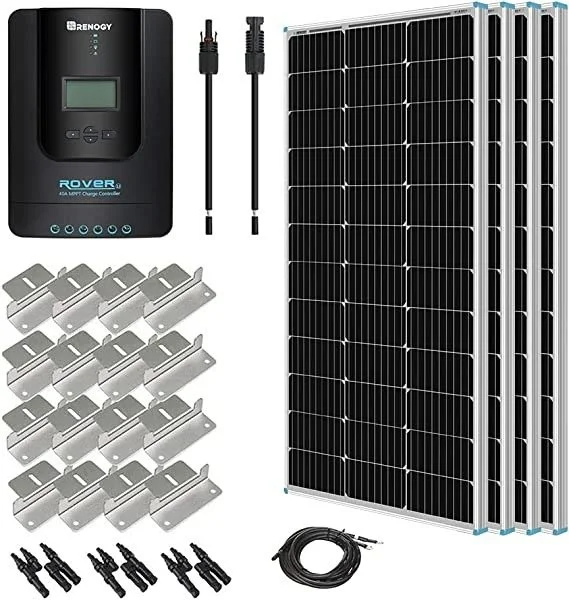
Review:
Renogy has great bundle packages to save you shopping time and money. They have a few kit options. The major differences are the number of panels and the type of charge controller. All of their RV solar panel kits come with mounting brackets and wiring to connect the panels to your batteries.
I recommend choosing a bundle with an MPPT charge controller (“Rover”) over their PWM option (“Wanderer”). MPPT charge controllers are more efficient and flexible when customizing your RV solar setup. If you are on a budget and don’t plan on changing your setup once installed, the PWM bundle will save you ~$100.
I love Renogy solar panels for RVs. If you choose Renogy, I recommend checking out their RV solar panel kit options. You can find one that will fit your needs and save you some money by bundling components in one purchase.
4) DOKIO Portable Solar Panel Kit
Best for: a budget friendly portable solar panel kit

MSRP: $199.99 for 220 watt panel, charge controller, and wiring
Dimensions: 29” x 21” x 1.1” (L x W x H)
Warranty: 1 year
Pros:
-
great price point
-
easy to fold and store
-
charge controller and wiring is included
Cons:
-
inefficient charge controller
-
1 year warranty is very limiting
Review:
Not everyone has the time or money to invest in a large RV solar setup. If you are looking to just keep your batteries charged without breaking the bank, DOKIO’s 220 watt foldable solar panel kit is a great option.
We had some friends on the road that continuously experienced a dead house battery in their RV. They weren’t trying to run big appliances or anything fancy. Just running the fan from the propane heating system would be enough to drain their battery after a couple hours.
Rather than constantly running their generator or spending thousands of dollars on a full RV solar setup, they bought this DOKIO solar panel kit for under $200. It is simple to set up and store away, and it will keep your batteries charged for when you need them.
5) BLUETTI EB70S: Solar Panel and Battery Kit
Best for: an RVer who wants flexibility with their power system’s location
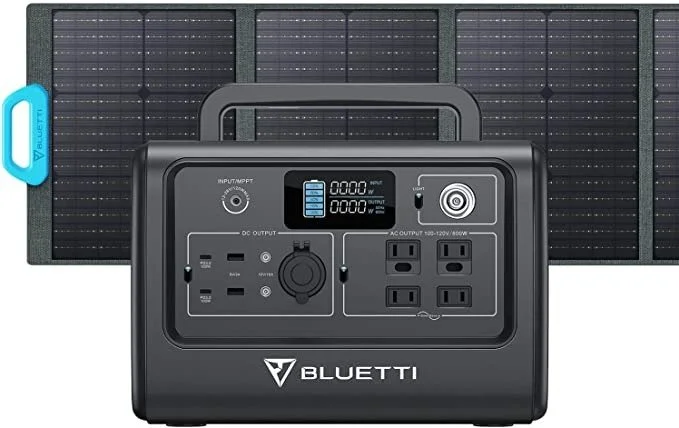
Review:
Portable power stations (sometimes called “solar generators”) are becoming popular, and we think that BLUETTI has the best product on the market.
The BLUETTI solar generator is very different than the other options on this list. The others can be wired directly to your RV’s electrical system, while this one give you flexibility to choose where you want your panels and where you want your power.
I love taking our BLUETTI portable power station to beautiful locations to set up my home office for the day. The whole setup weighs less than 25 pounds, so you can bring it to wherever you want power.
Portable power stations are great for part-time RVers who also want to use solar power outside of their RV. We love having our BLUETTI for days hanging out at the lake or BBQs where there is no close power source.
Read next —
Final Thoughts:
Adding solar panels to your RV will allow you to be free to wander off grid without a loud generator. I recommend that all RVers have some sort of solar option at least as a backup to charge up the RV house batteries.
Feel free to comment below if you have questions about a specific RV solar panel brand and we’ll let you know if we have any experiences with them to help you in your buying decision.
related posts:
Don’t forget to save this post for later!


